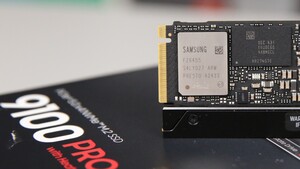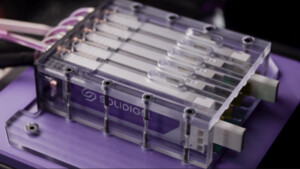FatManStanding
Lieutenant
- Registriert
- Aug. 2021
- Beiträge
- 534
Hi,
Ein- und Ausbau ist bei meinem Desktop immer etwas umständlich. Ist es möglich den Zustand einer SSD auch über ein 2,5''-Festplattengehäuse zu prüfen? Sie wird erkannt, SMART ist aktiv. Ein Longtest mit smartctl sollte eigentlich länger dauern, bringt aber sofort das hier:
Ein- und Ausbau ist bei meinem Desktop immer etwas umständlich. Ist es möglich den Zustand einer SSD auch über ein 2,5''-Festplattengehäuse zu prüfen? Sie wird erkannt, SMART ist aktiv. Ein Longtest mit smartctl sollte eigentlich länger dauern, bringt aber sofort das hier:
Code:
sudo smartctl -t long -a /dev/sde
smartctl 7.2 2020-12-30 r5155 [x86_64-linux-6.8.0-52-generic] (local build)
Copyright (C) 2002-20, Bruce Allen, Christian Franke, www.smartmontools.org
=== START OF INFORMATION SECTION ===
Device Model: SSD 4TB
Serial Number: 000313
LU WWN Device Id: 0 000000 000000000
Firmware Version: VA001CBY
User Capacity: 4.000.787.030.016 bytes [4,00 TB]
Sector Size: 512 bytes logical/physical
Rotation Rate: Solid State Device
Form Factor: 2.5 inches
TRIM Command: Available, deterministic
Device is: Not in smartctl database [for details use: -P showall]
ATA Version is: ACS-3, ATA8-ACS T13/1699-D revision 6
SATA Version is: SATA 3.0, 6.0 Gb/s (current: 6.0 Gb/s)
Local Time is: Mon Feb 24 11:09:11 2025 CET
SMART support is: Available - device has SMART capability.
SMART support is: Enabled
=== START OF READ SMART DATA SECTION ===
SMART Status not supported: Incomplete response, ATA output registers missing
SMART overall-health self-assessment test result: PASSED
Warning: This result is based on an Attribute check.
General SMART Values:
Offline data collection status: (0x00) Offline data collection activity
was never started.
Auto Offline Data Collection: Disabled.
Self-test execution status: ( 0) The previous self-test routine completed
without error or no self-test has ever
been run.
Total time to complete Offline
data collection: ( 1) seconds.
Offline data collection
capabilities: (0x59) SMART execute Offline immediate.
No Auto Offline data collection support.
Suspend Offline collection upon new
command.
Offline surface scan supported.
Self-test supported.
No Conveyance Self-test supported.
Selective Self-test supported.
SMART capabilities: (0x0002) Does not save SMART data before
entering power-saving mode.
Supports SMART auto save timer.
Error logging capability: (0x01) Error logging supported.
General Purpose Logging supported.
Short self-test routine
recommended polling time: ( 1) minutes.
Extended self-test routine
recommended polling time: ( 2) minutes.
SMART Attributes Data Structure revision number: 10
Vendor Specific SMART Attributes with Thresholds:
ID# ATTRIBUTE_NAME FLAG VALUE WORST THRESH TYPE UPDATED WHEN_FAILED RAW_VALUE
1 Raw_Read_Error_Rate 0x002f 100 100 050 Pre-fail Always - 0
5 Reallocated_Sector_Ct 0x0033 100 100 010 Pre-fail Always - 0
9 Power_On_Hours 0x0032 100 100 000 Old_age Always - 0
12 Power_Cycle_Count 0x0032 100 100 000 Old_age Always - 9
161 Unknown_Attribute 0x0032 100 100 050 Old_age Always - 19
162 Unknown_Attribute 0x0032 100 100 000 Old_age Always - 12
163 Unknown_Attribute 0x0032 100 100 000 Old_age Always - 3000
164 Unknown_Attribute 0x0032 100 100 000 Old_age Always - 0
166 Unknown_Attribute 0x0032 100 100 000 Old_age Always - 19
167 Unknown_Attribute 0x0032 100 100 000 Old_age Always - 0
168 Unknown_Attribute 0x0032 100 100 000 Old_age Always - 0
169 Unknown_Attribute 0x0032 100 100 000 Old_age Always - 100
171 Unknown_Attribute 0x0032 100 100 000 Old_age Always - 0
172 Unknown_Attribute 0x0032 100 100 000 Old_age Always - 0
174 Unknown_Attribute 0x0032 100 100 000 Old_age Always - 5
175 Program_Fail_Count_Chip 0x0032 100 100 000 Old_age Always - 0
181 Program_Fail_Cnt_Total 0x0022 100 100 000 Old_age Always - 162416
187 Reported_Uncorrect 0x0032 100 100 000 Old_age Always - 0
194 Temperature_Celsius 0x0022 100 100 000 Old_age Always - 40
195 Hardware_ECC_Recovered 0x003a 100 100 000 Old_age Always - 0
196 Reallocated_Event_Count 0x0032 100 100 000 Old_age Always - 0
199 UDMA_CRC_Error_Count 0x0032 100 100 000 Old_age Always - 0
206 Unknown_SSD_Attribute 0x0032 100 100 000 Old_age Always - 0
207 Unknown_SSD_Attribute 0x0032 100 100 000 Old_age Always - 0
232 Available_Reservd_Space 0x0032 100 100 000 Old_age Always - 0
233 Media_Wearout_Indicator 0x0032 100 100 000 Old_age Always - 124
241 Total_LBAs_Written 0x0032 100 100 000 Old_age Always - 33
242 Total_LBAs_Read 0x0032 100 100 000 Old_age Always - 27
249 Unknown_Attribute 0x0032 100 100 000 Old_age Always - 3
250 Read_Error_Retry_Rate 0x0032 100 100 000 Old_age Always - 38
SMART Error Log Version: 1
No Errors Logged
SMART Self-test log structure revision number 1
Num Test_Description Status Remaining LifeTime(hours) LBA_of_first_error
# 1 Short offline Completed without error 00% 0 -
SMART Selective self-test log data structure revision number 0
Note: revision number not 1 implies that no selective self-test has ever been run
SPAN MIN_LBA MAX_LBA CURRENT_TEST_STATUS
1 0 0 Not_testing
2 0 0 Not_testing
3 0 0 Not_testing
4 0 0 Not_testing
5 0 0 Not_testing
Selective self-test flags (0x0):
After scanning selected spans, do NOT read-scan remainder of disk.
If Selective self-test is pending on power-up, resume after 0 minute delay.
=== START OF OFFLINE IMMEDIATE AND SELF-TEST SECTION ===
Sending command: "Execute SMART Extended self-test routine immediately in off-line mode".
Drive command "Execute SMART Extended self-test routine immediately in off-line mode" successful.
Testing has begun.
Please wait 2 minutes for test to complete.
Test will complete after Mon Feb 24 11:11:11 2025 CET
Use smartctl -X to abort test.


